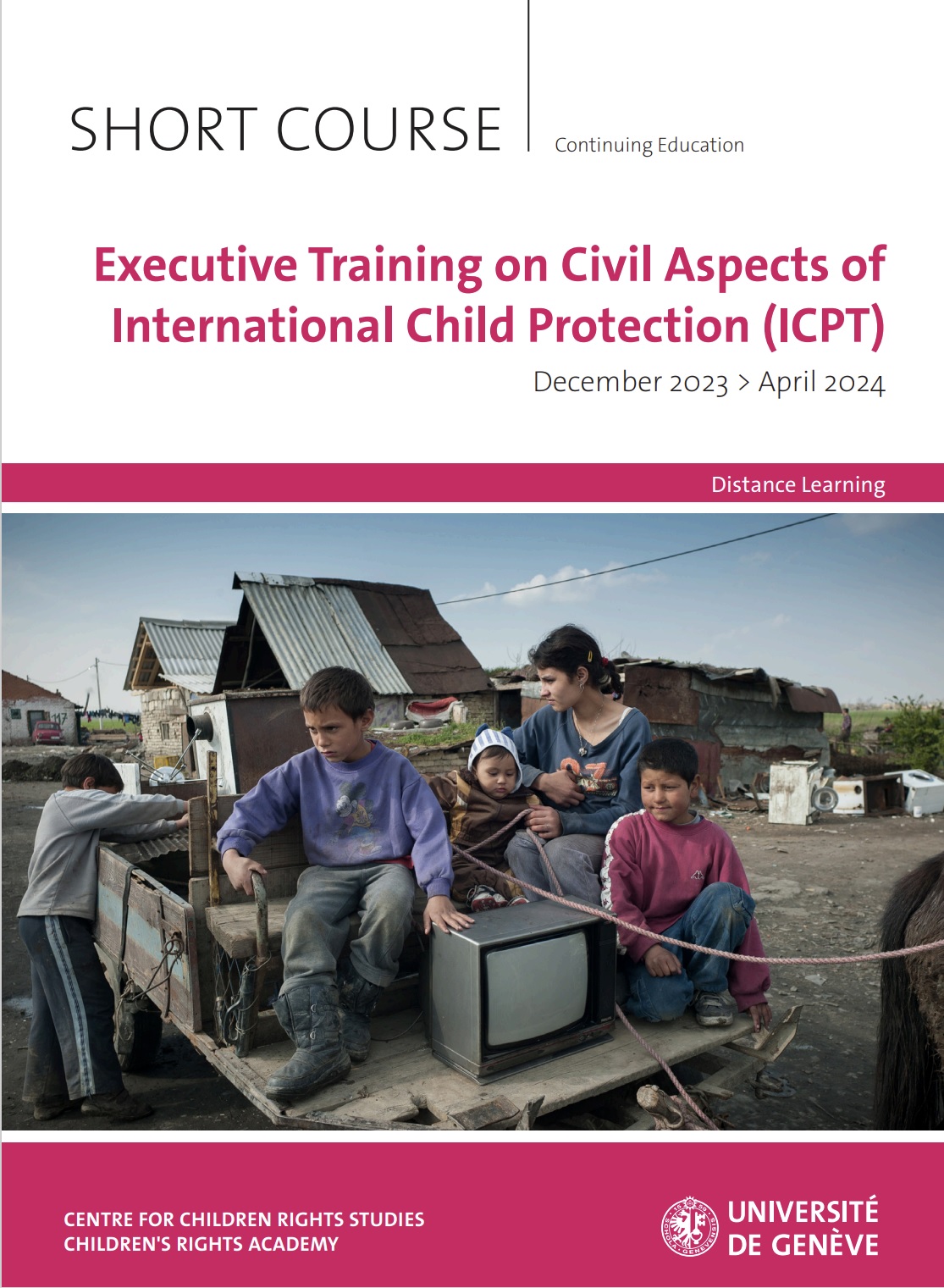University of Geneva: Executive Training on Civil Aspects of International Child Protection (ICPT) – from December 2023 to April 2024

The Children’s Rights Academy of the University of Geneva is organising an online Executive Training on Civil Aspects of International Child Protection (ICPT) from December 2023 to April 2024. For more information, click here.
The training is divided into four modules and is being coordinated by Dr. Vito Bumbaca. There is a registration fee (for the full programme or per module). Click here to register (registration is possible until 18 January 2024).
See below for a description of the modules.
Module 1 – 07 December 2023, 14:15 – 18:45 (online learning)
Children’s Individual Rights in Transnational Parental Relationships
This module pertains to the intersection of international child protection and children’s rights. Children in need of protection hold individual rights that are impacted by parental relationships, behaviours and conduct. Such rights are enshrined in universal, regional and national legal instruments, such as the UN Convention on the Rights of the Child, the European Convention on Human Rights and national Constitutions at first. Inherently, the UN Committee on the Rights of the Child and the European Court of Human Rights, respectively as quasi-judicial and judicial bodies, have in many occasions pinpointed the undeniable legal consequences, arising from parental relationships and litigation in national and transnational contexts, on the protection of children and their fundamental rights. Particularly, but not exhaustively, civil abduction, custody, adoption, surrogacy, family reunification, migration status, children’s properties have been crucial in the courts view for the determination of children as individual rights holders and subject to international protection. Lecturers will present selected topics of current research and practice, focusing on the above intersection. Discussions will follow after each intervention.
Module 2 – 18 January 2024, 14:15 – 18:45 (online learning)
International and Comparative Family Law
This module concerns the implementation of private international law rules governing international child protection, known as ‘International Family Law’. The latter includes international conventions and regional instruments typically determining jurisdiction, applicable law, recognition, cooperation among governmental and other bodies. As a comparative assessment, national laws, known as domestic rules, and national case law are part of this module. Parental relationships and litigation are the subject of multiple legal instruments, of national, regional and international nature, whose knowledge and interplay are fundamental for the timely transnational enforcement of child protection policies and measures. Also, alternative dispute resolution methods (i.e. Arbitration, Mediation) are referred to in this module as a way of preventing parental litigation in court. Lecturers will present selected topics of current research and practice, raising awareness about the above implementation and related issues, with the support of actual case law and law clinic. Discussions will follow after each intervention.
Module 3 – 29 February 2024, 14:15 – 17:45 (online learning)
Vulnerable Migration
This module deals with the protection of unaccompanied minors, as well as with separated and displaced children seeking asylum. The context is the one of transnational movements whereby various vulnerable scenarios would be encountered, such as guardianship, legal representation, family reunification, civil abduction, child custody, recognition of child and family statuses. These are some of the legal situations that are envisaged by parallel family law and migration law procedures involving interconnected issues of vulnerable migration and child protection for civil purposes. Lecturers will present selected topics of current research and practice, handling this specific context in which transversal knowledge of international family law and migration law is required. Discussions will follow after each intervention.
Module 4 – 18 April 2024, 14:15 – 17:45 (online learning)
Practice of Child Protection Stakeholders: Inter-agency Co-operation in Context
This module accentuates both the legislative and practical course of transnational governance of child protection policies and civil measures, addressing the question of “who does what”? What are the potential fora in which international child protection policies are discussed, approved and enforced? Practically, when a child is a victim of international civil abduction, what actors may be involved and how do they cooperate? This module aims to clarify and assess the role of all actors possibly involved in legislating and implementing child protection civil procedures, also with respect to vulnerable migration and asylum contexts, notably civil abduction, parental responsibility, maintenance, and alternative care. Lecturers will present selected topics of current research and practice from the perspective of the stakeholders involved in international child protection policies and practices. Discussions will follow after each intervention.
Speakers
Dr. Roberta Ruggiero, CIDE, CRA, UNIGE
Prof. Olga Khazova, UNCRC (former member)
Prof. Karl Hanson, CIDE, UNIGE
Prof. Gian Paolo Romano, Law Faculty, INPRI, UNIGE,
Mr Philippe Lortie, Family Law Division, Hague Conference on Private International Law
Mr Michael Wilderspin, DG Just, European Commission
Dr. Ilaria Pretelli, Swiss Institute of Comparative Law
Prof. Vincent Chetail, International Law Department, Global Migration Centre, IHEID
Irina Todorova, Noelle Darbellay, Core Protection Unit, International Organization for Migration
Dr. Mayela Celis Aguilar, University of Maastricht
Prof. Jason Harts, Professor of Humanitarianism & Development at the University of Bath
Dr. Nicolas Nord, International Commission on Civil Status (ICCS/CIEC)
Joëlle Schickel, Federal Office of Justice, Swiss Central Authority
Jean Ayoub, International Social Service General Secretariat
A brochure with detailed information is available here.